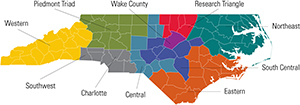Winter weather is fast approaching and although North Carolina winters are often mild, you don’t want to be caught unprepared when freezing temperatures hit. According to U.S. climate data, the average low temperature of a North Carolina winter is 30 degrees. Below freezing temperatures pose a serious threat to those that work in cold weather environments: cold stress.
So, what is cold stress? Cold stress occurs by driving down the skin temperature and eventually the internal body temperature. When the human body is exposed to near-freezing temperatures for an extended period, it starts to shut down and tissue begins to die. Cold stress can range from trench foot, frostbite to hypothermia. A symptom like uncontrollable shivering is your body’s way of letting you know it is losing heat and should be addressed before it progresses into the more severe stages of hypothermia.
Some factors increase the risk of cold stress. Windspeed, wetness/dampness, being underdressed, having a pre-existing condition or being in poor physical condition are all factors that can escalate the risk of cold stress. If your feet get wet in cold weather environments, remove your socks and shoes immediately and replace them with dry socks and shoes.
One of the main ways you can prevent cold stress is by dressing appropriately for harsh weather conditions. If you’re working in 30-degree weather, it’s not a good idea to come to work without an insulated jacket. Providing a heat source in the workplace, such as radiant heaters, can also help prevent cold stress. Cold weather also causes blood vessels to restrict, putting more strain on the heart and increasing the heart attack or stroke risk. Working in pairs can ensure there is someone nearby in case of an emergency.
If you would like to learn more about preventing cold stress or cold stress first-aid, OSHA maintains a cold-weather safety page with recommendations and instructions.
—
Shelby Kimes is a Marketing Content Writer in the marketing department for NC State Industrial Expansion Solutions. She writes marketing content for various IES and media platforms to communicate the services and values of IES. She also writes the marketing material needed to alert existing and/or potential clients of any updates within IES. She previously interned with the marketing department at Greenville Parks and Recreation in North Carolina. Shelby graduated from East Carolina University with a Bachelor’s in Sports Studies and a Minor in Marketing/Business Administration.





